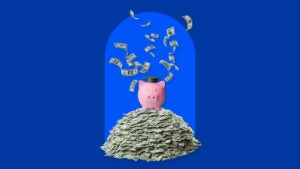Do I have to pay my student loans if I’m unemployed?

Key takeaways
- You still need to make payments or make alternative arrangements with your lender while unemployed. If you make no payments, your loans will eventually go into default.
- Forbearance, deferment and alternative payment plans are some of the options available if you’re unemployed and cannot make loan payments.
- The options available differ based on whether you have federal or private student loans.
If you’re unemployed and have student loans, you may be wondering what to do about your monthly payments. You’re still need to make your student loan payments unless you request a specific form of relief from your lender. In other words, your student loans don’t automatically go into deferment or forbearance once you become unemployed.
Lenders that do offer periods of forbearance typically limit those periods to a few months at a time and a few years total over the life of your loan, so depending on whether you’ve taken advantage of one before, the option may not be available. In such cases, you would need to continue paying your loans while unemployed.

Passage of Trump's One Big Beautiful Bill Act (OBBBA)
Major changes are here to come for the federal student loan program. See how these changes may affect you.
Learn moreWhat happens if you don’t pay while you’re unemployed?
There are a number of things that can happen if you don’t pay your student loans while you’re unemployed. Consequences differ depending on how long you don’t pay and your situation. Here’s what could happen:
- Your loans become delinquent: This happens if you are a few days late on your payment, and your loans remain that way until you pay the past-due amount or change your payment plan.
- Your loans go into default: If you continue to make no payments, your loans will officially go into default; this happens after 270 days of nonpayment for most federal student loans, and typically after 90 days of nonpayment for private loans.
- You’ll owe late fees: In the short term, late payments mean getting hit with late fees. These may vary depending on your lender and loan servicer.
- Your credit score suffers: Loan servicers report late payments and defaults to the credit bureaus, which means that your credit score will start to drop.
- You’ll struggle to get a loan in the future: Your credit score taking a nose dive hurts your chances of borrowing in the future, whether it’s applying for a credit card, an auto loan or a mortgage.
- You may lose future earnings: You could lose out on earnings until your loan is paid. For instance, your tax refund, federal benefit payments and wages could all be garnished to pay off your outstanding student loan debt — so it’s important to get ahead of your student loans before you hit that default stage.

Student loan delinquency
Stressed about the Big Beautiful Bill and what it means for your student loans? Afraid of going into default? See how the bill will affect borrowers in states with the highest number of student loan delinquencies.
Learn moreHow to reduce your student loan payments while unemployed
If you’re unemployed and looking for ways to adjust your student loan payments, you have a few options, but they depend on whether you have federal or private student loans.
Federal student loans
Unlike private student loans, federal student loans offer standardized benefits. Because of the OBBBA, some of these options will be phased out by next year and will have updates about them instead:
1. Income-driven repayment plans
Income-driven repayment plans base your monthly payments on your income and household size. The downside is that you would be placed on a new repayment plan lasting 20 or 25 years.
Currently the income-based repayment plan (IBR) may be your best option. With the passage of OBBBA, only two repayment options will be available for students who take out federal loans on or after July 1, 2026: a standard repayment plan or the new income-based repayment plan called the Repayment Assistance Program (RAP).
Other existing repayment plans, such as the income-contingent repayment plan (ICR) and the graduated repayment plan, will be discontinued. If you are under the SAVE plan, your interest will start to accrue in August.
Bankrate’s take: IBR will be available until RAP can officially be rolled out, so if you are on a plan that will be discontinued, you will need to switch out – at least to IBR – by July 1, 2028.
2. Deferment
OBBBA has slashed unemployment and economic hardship deferment, which would have allowed you to pause your payments for up to three years. For students whose loans will be disbursed after July 1, 2027, these reasons will no longer be a valid reason for deferment.
Until then, you’ll need to be receiving unemployment benefits or be unable to find full-time employment to fulfill this deferment qualification. You can complete an unemployment deferment form to apply. The questionnaire will let you know if you’re eligible for deferment or not. You’ll send this form, along with any relevant documentation, to your loan servicer.
Bankrate’s take: If you plan to apply for Public Service Loan Forgiveness (PSLF) or IBR, know that applying for deferment can impact your eligibility.
3. Forbearance
Another option is forbearance. Like deferment, forbearance is typically limited to a few months at a time, so it’s not a good long-term option. Interest typically accrues during forbearance, but for most loan types, the interest won’t be capitalized. Instead, it will be rolled into your regular monthly payments once forbearance ends.
The one exception is FFEL Program loans. These are not managed by the Department of Education, so they work differently. If you don’t pay the interest during forbearance, it will capitalize when forbearance ends.
The process of applying for forbearance is very similar to deferment. Fill out the appropriate form based on the type of forbearance you want to apply for. Provide the form and any supporting documents to your loan servicer.
Keep in mind: Remember to keep paying your loans until you are granted forbearance. Missed payments can impact your loan status and eligibility for forbearance.
Your loan servicer gets to decide if it will give you general forbearance. You can apply for general forbearance with any of these loan types:
- Direct Loans (OBBBA will eliminate graduate PLUS loans)
- Federal Family Education (FFEL) Program loans
- Perkins Loans
If you qualify for mandatory forbearance, your service is required to give it to you. Reasons to qualify for mandatory forbearance include:
- Americorps service
- Department of Defense Student Loan Repayment Program
- Medical or Dental Internship or Residency
- National Guard Duty
- Student Loan Debt Burden
- Teacher Loan Forgiveness
Note that the OBBBA has reduced forbearance from 12 to nine months. You can reapply if the need occurs and you are eligible. Generally, periods of forbearance don’t count towards PSLF or IDR, but there are some exceptions. Check with your servicer to understand the specifics of each forbearance option.
4. Graduated repayment plan
Under the OBBBA, the graduated repayment plan will eventually be eliminated on July 1, 2026. If you are currently on the plan, this will continue to be available after the date, but one important thing to keep in mind is that if you borrow more federal money after the aforementioned deadline, you will lose access to the graduated repayment plan.
Private student loans
Private student loan lenders all set their own options for lowering student loan payments, so the programs available depend on your lender, but you may find options for the following:
1. Deferment or forbearance
Most lenders offer deferment or forbearance to pause your loan payments for a few months at a time. Most lenders cap these programs at 12 or 24 months over the life of your loan. Interest may or may not accrue – this varies by lender. Talk to your lender about the details of their deferment or forbearance options.
For deferment, the application process depends on your lender. Many will have instructions for applying on their websites or in your online account, though you’ll likely have to call your lender to find out your options.
2. Refinancing
If you’re struggling with student loan payments and your lender doesn’t offer deferment, you may choose to refinance instead. In this case, you’ll still be on the hook for student loan payments, but you may be able to negotiate a lower monthly bill.
If you aren’t sure what your lender offers, it’s worth asking. Many lenders would rather work with you on a compromise than see you default on your loans, so give your lender a call to see what options are available.

Best refinance student loan lenders
Thinking of refinancing your student loan and want to shop around for the best rate? Take a look at Bankrate's picks of top refinance lenders.
Learn moreBottom line
If you’re unemployed and having trouble repaying your student loans, contact your lender or loan servicer immediately to see if it offers deferment, forbearance or unemployment protection. Continue paying your student loans until your lender approves you for forbearance or another alternative repayment option to avoid negative consequences, like late fees and severe harm to your credit.
Why we ask for feedback Your feedback helps us improve our content and services. It takes less than a minute to complete.
Your responses are anonymous and will only be used for improving our website.
You may also like

How to get student loan help: Organizations to look into

Do you need a cosigner for student loans?





